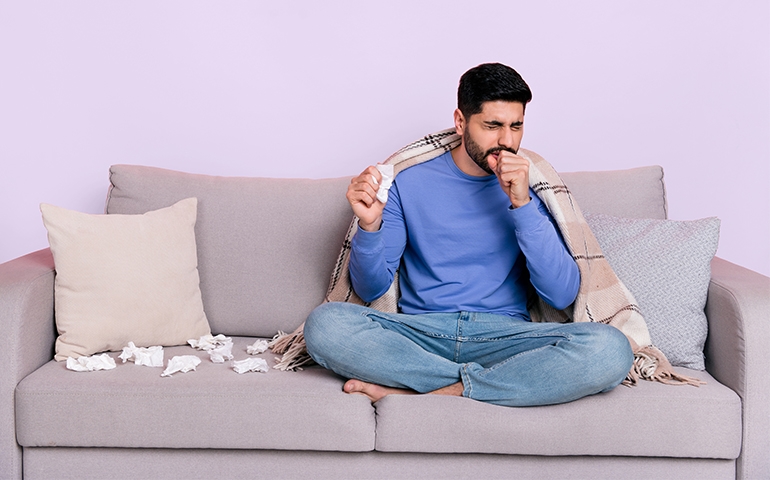
It is everyone’s least favourite season of the year – cold and flu season. While catching a cold or the flu can happen in any month, peak season usually falls right about now between January and February. This troublesome time recently followed by family festivities, holiday travel, and colder climates are when these viruses tend to take hold and pose a problem for our eyes and the rest of our bodies.
If you find yourself sniffling, coughing, and about to sneeze – here is some advice on how to limit the unpleasantness and keep your eyes at ease.
Is it safe to wear contact lenses when you have a cold or flu?
While it is considered safe to wear your lenses when you have a cold or the flu, it is often wiser to go without them and opt for your glasses instead.
Symptoms like sneezing and a runny nose can transfer a lot of unwanted germs to your hands and face, which in turn can end up in your eyes if you are not careful. Potentially even leading to an infection like ‘pink eye’ (conjunctivitis). While this can still occur with or without wearing your contact lenses – limiting the number of times you touch or rub your eyes whilst feeling ill is for the best.
With lengthy expiration dates, there is no need to rush. Your lenses will be ready when you are back to 100% again.
How to safely wear lenses if you have a cold, the flu, or Covid symptoms
Even though we advise giving your eyes a break from lenses if you are feeling ill – if for some reason you must wear contacts, please follow these helpful hygiene tips:
Limit your lens use – Only wear lenses when necessary. Do not adhere to your regular lens-wearing schedule if you wear them every day, take days off and reduce the number of hours you would typically have them in.
Practice good hand hygiene – The most common way to transfer germs to your eyes is with your hands. Follow the same basic hygiene rules as you would when usually inserting and removing your lenses but bump it up a level. Ensure you diligently wash your hands for over 20 seconds with hot soapy water, preferably using an anti-bacterial soap. Clean every bit of your fingers and under your fingernails where bacteria may be hiding before touching your lenses.
Consider daily lenses – Packaged in one-time-use sterilised blister packs; daily disposable lenses do not require an ongoing cleaning routine that can add extra touchpoints of contamination.
Don’t forget to disinfect accessories – Did you grab your lens case before washing your hands? If so, then it will need a deep clean too. Accessories like solution bottles and cases can serve as an additional vector of transmission or breeding ground for bacteria. So, remember to keep them sanitised properly. Keep in mind It is always good practice to replace your contact lens case once a month.
Use drops for dry eyes – When battling an infection or a virus, your eye’s tear production can be disrupted and dehydrated. And certain medications meant to treat your illness can even amplify dry eyes. Keep them frequently moisturised with lens-safe lubricating drops like Blink Intensive Triple-Action eye drops that allow you to apply them without needing to remove your lenses and avoid contamination. Keeping the body hydrated with plenty of fluid & water will help combat dry eyes also.
Eye infection awareness – If you believe you might have contracted an eye infection, stop wearing your lenses and discard them along with their lens case. Contact your optician immediately. Do not share towels with other household members, as this can spread infection. Only resume contact lens wear once your optician has authorised it.

How to reduce your chances of getting the flu
Much like the basic care steps you would take when wearing lenses, like extensively washing your hands and avoiding rubbing your eyes. Use these other healthy habits to help limit your exposure to coming down with an illness:
- Thoroughly wash your hands with hot water and soap (for 20 seconds or more).
- If soap is unavailable, clean your hands with an alcohol-based hand sanitiser.
- Avoid touching your eyes, mouth, and nose with unwashed hands.
- Do not share towels or flannels with other people in the same household as this can spread infection to others.
- Avoid close contact with others who are feeling or sound ill.
- Stay away from congested and crowded areas where others may be sick.
- Disinfect frequently touched items such as your phone, door handles, and surfaces on public transport.
- Wear a face mask if you need to be in a crowded public setting.
Should you wear contact lenses if you are feeling sick?
In most cases, no. If you are feeling sick, it is best to give your eyes (and body) the rest they need and avoid wearing your contact lenses. Rely on your glasses to correct your vision until your symptoms are gone. Once recovered, you are ready to reach for your favourite lenses again.